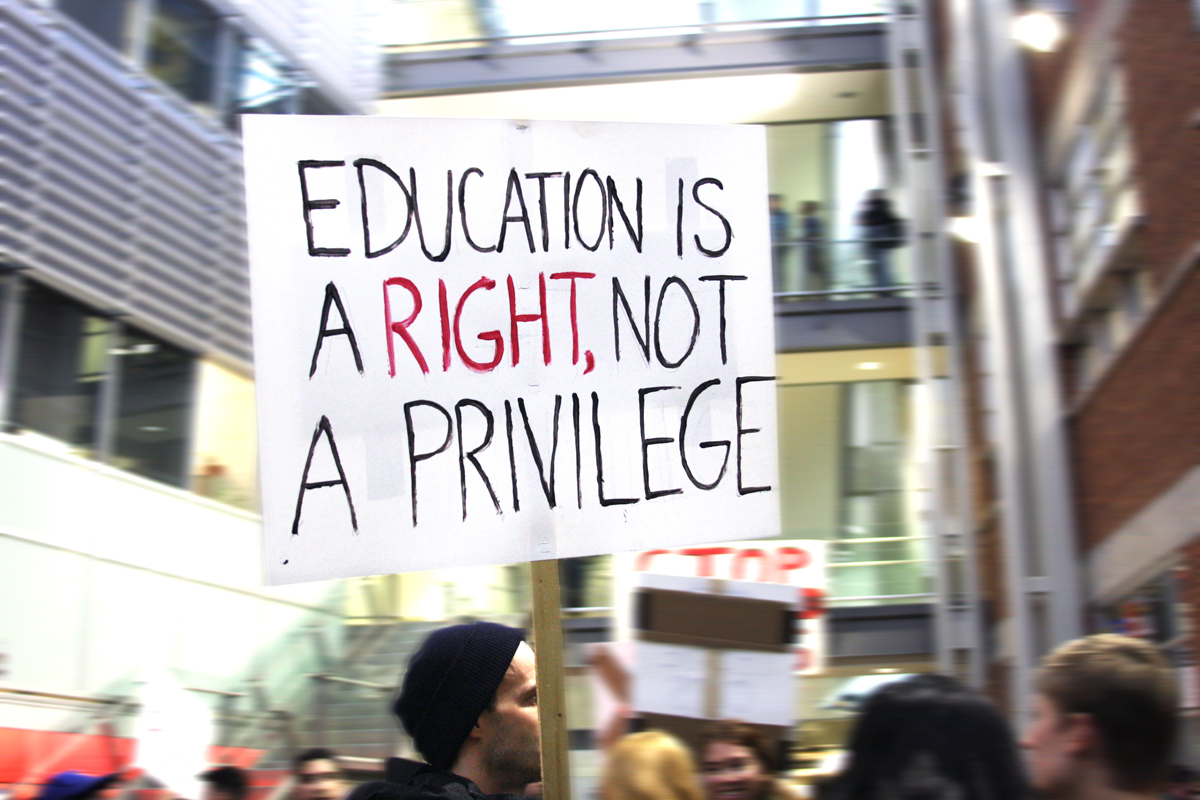Having lived through UMFA’S 2016 and 2021 strikes as an undergraduate and as a graduate student, I like to keep my ear to the ground about labour disputes in other post-secondary institutions across Canada. Early March is bargaining season for unions at post-secondary institutions across Canada, so the first week of the month played out like a sordid gumball machine bleakly dispensing news of obstinate employers.
A small university in Halifax recently went through a low-profile struggle that was nonetheless significant. Mount Saint Vincent University Faculty Association (MSVUFA) saw the end of the longest strike in the association’s history on March 5.
Around Canada, the first week of March rang in a wave of potential strike actions just a few days out from the end of MSVUFA’s.
In Toronto, negotiations between the University of Toronto and two locals of the Canadian Union of Public Employees (CUPE) 3261 and CUPE 3902 went down to the wire. CUPE reached an agreement with the U of T just minutes before the strike date of March 4.
The unions, which represent the bulk of U of T’s teaching assistants, service workers and contract lecturers, among others, landed wage increases and a commitment from the employer to seek a 45 per cent discount on transit for union members in Toronto, and much more.
After voting to strike on Feb. 10, the Brandon University Faculty Association (BUFA) was set to strike starting Monday, March 4. The Brandon Sun reported the strike was averted when “inroads” were made as Brandon University continued to bargain with BUFA.
These sorts of partial, hairbreadth success stories can skew the picture of labour rights movements in Canadian universities right now. Workers at several other places of higher learning are, in this very moment, fighting for their labour rights with no immediate promise of a win.
On the horizon, the Lecturers’ Union of Memorial University of Newfoundland (LUMUN), a union of contract lecturers and post-doctoral fellows, has issued a strike mandate to its employer, Memorial University of Newfoundland, as of March 4.
Currently, LUMUN lecturers earn $5,000 per three courses they teach. This means that, if a lecturer teaches three classes per semester for the fall and winter terms, they would be earning $9,200 less than a minimum wage worker in Newfoundland and Labrador would by working 40 hours a week for 8 months of the year at $15 an hour.
Of course, as all educators know, teaching even one class can eat up all one’s free time depending on how trigger-happy students are with sending frantic, late-night emails in caffeine-fuelled frenzies. $5,000 compensation definitely does not equate to minimum wage if we factor in the amount of actual work instructors are likely doing.
What incentive is there to take this work on when you can earn more working regular hours at McDonald’s?
All of these actions are either resolved or in the future, but CUPE 3903, a union of sessional instructors and TAs largely populated by graduate students at York University, is on its third week of striking as of March 11.
The union’s last strike in 2018 famously dragged on for close to 5 months, at which point the Ontario Progressive Conservative government issued back-to-work legislation.
The 2024 strike is not looking much brighter, as CUPE 3903’s X (formerly known as Twitter) account posted that Toronto police arrested one picketer on March 4 for setting up the picket line.
Looking at these disputes as a gestalt reveals a pattern. Tuition is increasing across Canada while universities send down ordinances that their employees must tighten their belts. When unions decide to or do exercise their rights to strike in response, they’re met with record-breaking greed from their employer or the threat of police violence.
Students, for their part, are usually frustrated during strikes, reacting with hostility and even, on occasion, violence towards striking labourers. Some of my own friends who have gone on strike at different universities around the country have shared horror stories from the picket line of undergraduates hurling hot coffee at them or grabbing strike paraphernalia and hitting picketers.
Of course, there are undergraduate students who sympathize with strikers, but are still left with the same frustrations. Tuition increases either way, and this increase never feels like it bears fruit in a higher quality education.
No matter what, academic strikes revive the mantra that the people who are really getting shafted are students.
But what this perspective ignores in CUPE 3903’s case is a significant portion of the membership are students who, just like undergrads, have to deal with increasing tuition. Large portions of graduate students’ funding are tied to their TAships, which at York pay just over $12,000 per year. This wage is a grotesque pittance in the Greater Toronto Area, where rent for even a modest one-bedroom apartment has blown past $2,500 per month.
This means that CUPE workers deal with both the university’s aversion to paying its employees and the university’s avaricious approach pricing education. CUPE 3903’s strike is fundamentally an issue of students’ rights.
These struggles might seem irrelevant to the U of M’s locality. None of our unions are striking, so why think about strikes right now?
UMFA’s collective agreement with the U of M expires on March 31, 2024. The turnover in undergraduate populations is around 4 years, so the sort of institutional memory of the 2021 strike that helps students understand why supporting strikers is important has likely faded in no small measure. U of M students who might be around next year should think about where to place their support if and when any of the U of M’s unions go on strike.
What’s more, we should be thinking about why UMSU hasn’t organized a strike for its own part. The union’s inefficacy over the years in the face of rising tuition, the revocation of international students’ healthcare and the censorship of students who criticize the genocide of Palestinians have proven UMSU is grossly disengaged from real political issues.
More than 20,000 Concordia and McGill students will be striking proposed tuition increases in Quebec for out-of-province and international students — students from France and Belgium alone are exempt. This sort of tangible action is something UMSU execs never even promise as they campaign, let alone engage in when they do enter office.
History suggests present U of M students need to brace themselves for the possibility that a strike could happen during the course of their degrees. Look to strike actions happening at other universities right now and think tactically about what to do if you experience the same thing.
Tracy Karuhogo’s tenure as UMSU president has been marred, just like her predecessors’, by a general ineffectuality and callously turning away from issues that really matter. As Divya Sharma takes up her mantle and the potential need for UMSU to show solidarity looms, U of M students need to push union leadership to do more for students’ rights than post links on Instagram inviting students to seek mental health resources when it’s time to take action.




